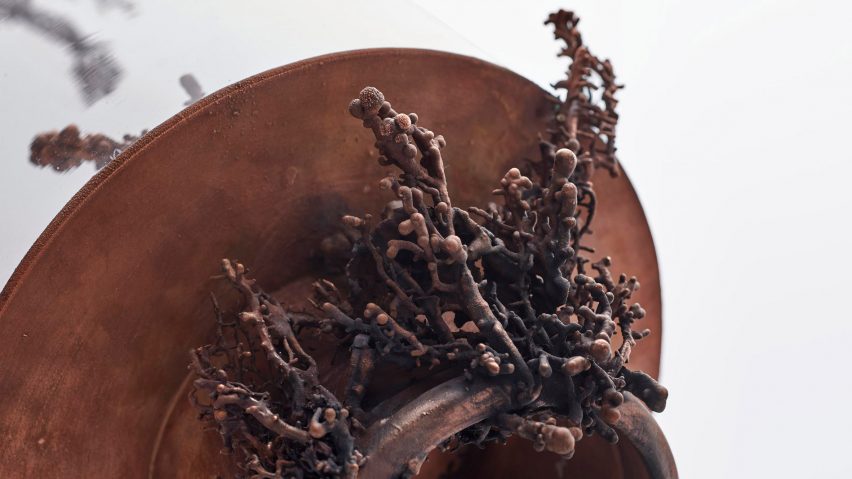Artist Katrin Spranger's series of copper and glass sculptures made from plumbing parts and laboratory objects look to an imagined dystopian future.
On show at last month's Decorex trade show in London during the London Design Festival, the Aquatopia collection consists of reimagined drinking vessels, scooping bowls, water storage, shower funnels and a bath.
The items are made out of oxidised copper piping fused with laboratory glassware to create objects that appear as if they have been submerged underwater for a long time.
Inspired by water systems, the abstract vessels' surfaces are covered in lichen-like forms that are created using an electro-forming technique.
Spranger makes the objects' surfaces able to conduct electricity by painting them with conductive paint, and then runs a current through them. This allows a layer of copper in unusual forms to be deposited.
Spranger experimented with dried plants, like moss and sea fern, as well as using naturally conductive materials such as steel.
"Due to the law of electricity, naturally protruding tips and edges attracted more metal, whereas cavities were hard to take on any at all," she explained.
"Aquatopia takes a critical view on our fresh water supplies, its increasing demand and pollution," explained Spranger. "In this dystopian narrative, pure water is on the verge of depletion, consumption is challenged and water waste is kept to a minimum."
"Made of copper and glass, materials traditionally used for transporting and storing water, the craft objects straddle the line between function, imagined function and aesthetic quality. Decorative, plant-like growth formations on each vessel symbolise that life is completely dependent on water," she added.
Spranger is known for her jewellery and sculpture pieces that explore science fiction, environment and consumer culture, often focusing on resources that might become depleted in the future.
Her work as a jeweller informed this collection as she uses scarce precious metals in her pieces, which made her think about how we assign value to resources.
"Apart from the fact that they have great properties such as malleability and durability, it became quite clear to me that their perceived value correlates to their scarcity," explained Spranger.
Photography is by Sylvain Deleu

